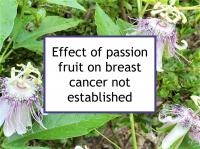Passion fruit (Passiflora edulis) is a round or oval fruit, smaller than a lemon, with a moist interior filled with coated seeds. Purple passion fruit is the cultivar normally sold in the U.S. Some passion fruit juice products contain the juice of the other main passion fruit cultivar, yellow passion fruit.
Passion fruit has been shown to have antioxidant and antifungal properties. Passion fruit seed fiber has been found to be effective in improving intestinal function and health and may help reduce cholesterol. Purple passion fruit extract has been demonstrated to reduce anxiety-related behaviors in laboratory rats without disrupting memory processes. A preliminary screen of 1,220 Brazilian rain forest plant extracts from 352 plants found that passion-flower plant family extracts were among the few that demonstrated cytotoxicity against human prostate cancer cells.
Passion fruit is an excellent dietary source of cyanidin-3-glucoside, piceatannol (a structurally-related analog of resveratrol), and fiber. Passion fruit is also a good source the carotenoids beta-carotene, beta-cryptoxanthin, as well as some lutein and zeaxanthin. It also contains some quercetin, and vitamin C. However, few studies have examined the possible associations between passion fruit consumption and breast cancer risk.
Avoid unripe passion fruit
Both the flesh and seeds of passion fruit should not be eaten until the fruit is ripe since they may contain cyanogenic glycosides (a source of hydrogen cyanide, which is toxic) when immature.
Passion fruit seeds are edible
The seeds of passion fruit are edible, and can safely be swallowed whole, chewed or eaten after being puréed in a blender by most people. However, those with diverticulitis should avoid the seeds and those with diverticulosis should limit their consumption (although there is disagreement on this—some experts believe it is safe for those with diverticulosis to eat the seeds while others advise that they should be avoided entirely).
Passion fruit skin should not be consumed
Passion fruit skin (whether purple or yellow) should not be consumed since it contains a small amount of toxic cyanogenic glycosides.
There are some herbal preparations based on the passion fruit skin, such as purple passion fruit peel extract (used to treat asthma and high blood pressure), which have been shown to be safe. In such cases, it is to be hoped that the passion fruit variety used by the manufacturer has low levels of cyanogenic glycosides and the skin is processed in such as manner as to eliminate any cyanide. However, we would suggest caution in using such products on an ongoing basis.
Breast cancer-related effects of consuming passion fruit
One screen of Brazilian plants found no cytotoxic activity against human ER+/PR+ breast cancer cells by the passion fruit extracts studied. On the other hand, a 2024 Indonesian study reported that passion fruit seed extract induced cell death in ER+/PR+ breast cancer cells.
Passion fruit is a significant source of the anthocyanin cyanidin-3-glucoside and the stilbene piceatannol, both of which have been shown to possess both chemopreventive and chemotherapeutic activity with respect to breast cancer.
Cyanidin-3-glucoside
Anthocyanins have been shown to inhibit breast cancer proliferation, inflammation and angiogenesis (the formation of new blood vessels). Cyandin-3-glucoside in particular has been shown to reduce HER2+ cell proliferation and interfere with the viability and metastatic potential of triple negative (ER-/PR-/HER2-) breast cancer cells. Cyandin-3-glucoside has also been shown to enhance the treatment effects of trastuzumab (Herceptin) in HER2+ breast cancer cells. In addition, cyanidin-3-glucoside has been demonstrated to heighten the efficacy of the chemotherapy drug cisplatin.
Piceatannol
Passion fruit seeds are an excellent source of piceatannol (3,4,3'5'-tetrahydroxy-trans-stilbene), which has been shown to inhibit the migration and growth of normal breast cancer cells treated with a tumor promoter, in effect blocking the transformation of the cells into cancer cells. Piceatannol has also been demonstrated to reduce the invasion and migration of triple negative breast cancer cells without affecting the viability of normal cells. In addition, piceatannol has been reported to induce programmed cell death (apoptosis) of ER+/PR+ breast cancer cells.
Additional comments
Raw passion fruit is strongly acidic. Therefore, commercial passion fruit juice typically has been subjected to deacidification by electrodialysis or other means and might have added sugar.
Hawaiian lilikoi butter, which normally is made from sugar and passion fruit juice, puree or concentrate, and may incorporate butter and eggs, can have an unhealthful nutrition profile which cancels the benefits of any passion fruit it may contain. A better choice would be homemade lilikoi butter in which the levels of sugar and saturated fat can be limited.
Sources of information in this webpage
The information above, which is updated continually as new research becomes available, has been developed based solely on the results of academic studies. Clicking on any of the underlined terms will take you to its tag or webpage, which contain more extensive information.
Note that while we are continually searching for new evidence specifically concerning this food, there is not much interest in it among breast cancer researchers, so few relevant studies are available.
